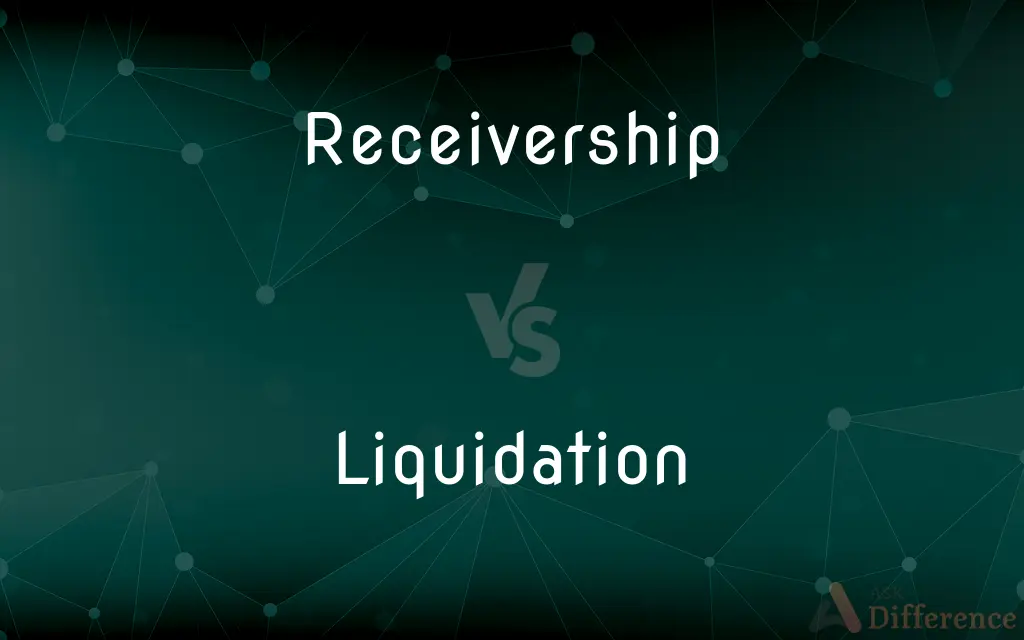Receivership vs. Liquidation — What's the Difference?
By Tayyaba Rehman — Updated on September 27, 2023
Receivership is a legal process where a receiver is appointed to operate the company to recover debts. Liquidation involves selling a company's assets to pay off creditors. Both processes aim at resolving insolvency but operate differently.

Difference Between Receivership and Liquidation
Table of Contents
ADVERTISEMENT
Key Differences
Receivership is a legal procedure wherein an entity, referred to as a receiver, is assigned to manage a company's operations with the principal aim of repaying the debts owed to creditors. Liquidation, on the other hand, denotes the process of dissolving a company by selling its assets to pay off outstanding debts and obligations.
In receivership, the emphasis is on managing and restructuring the company to allow for debt repayment, potentially allowing the company to continue operating. Liquidation strictly involves the cessation of business operations and the selling off of assets, signaling the end of the company's existence.
Receivership may offer a pathway for a business to regain its footing and eventually emerge from financial distress, whereas liquidation finalizes the company's demise, distributing any remaining funds to creditors and shareholders after asset sales, marking a conclusive end to business operations.
The outcomes of receivership can vary; the business might continue to run, change ownership, or eventually liquidate depending on the financial recovery. Liquidation has a predetermined outcome—the dissolution of the business and the distribution of its realized assets to stakeholders according to the priority of claims.
While both receivership and liquidation are mechanisms to address insolvency, receivership offers a glimpse of hope for business continuity, whereas liquidation marks the end, the termination of the company’s life and operations, after satisfying the claims of creditors to the extent possible.
ADVERTISEMENT
Comparison Chart
Purpose
To operate the company to recover debts
To sell company's assets to pay off creditors
Outcome
Can vary: restructuring, change of ownership, liquidation
Dissolution of the company
Focus
Management and potentially continuing operations
Ceasing operations and asset sale
Possibility of Continuation
Exists, depending on recovery and restructuring success
None, it marks the end of the company
Benefit to Creditors
Partial or full debt recovery is possible
Payments from asset liquidation, may not fully cover debts
Compare with Definitions
Receivership
A legal procedure where a receiver is appointed to operate a company for debt recovery.
The struggling company was put into receivership to repay its enormous debts.
Liquidation
The process of dissolving a company by selling its assets to settle debts.
The company faced inevitable liquidation after accruing insurmountable debts.
Receivership
The condition of having a court-appointed manager due to insolvency.
The firm's financial turmoil led to its inevitable receivership.
Liquidation
The conversion of assets to cash to pay off creditors in the event of insolvency.
Liquidation was the last resort to meet the claims of relentless creditors.
Receivership
A transitional state possibly leading to liquidation, restructuring, or recovery.
The outcome of the receivership remained uncertain, pending the receiver’s strategies.
Liquidation
A conclusive step, distributing remaining funds to creditors post asset sales.
Liquidation proceedings ensured fair distribution of remaining resources to creditors.
Receivership
A phase where the management of a company is overseen by an external party.
The company’s receivership resulted in significant organizational restructuring.
Liquidation
The termination of a business operation due to the inability to cover debts.
Liquidation marked the regrettable end of the once-thriving enterprise.
Receivership
A method to allow distressed companies to repay their outstanding debts.
Receivership allowed the company a structured path to settle its liabilities.
Liquidation
The final resolution of a company’s existence by settling all claims and obligations.
The company’s journey concluded with a structured liquidation process.
Receivership
In law, receivership is a situation in which an institution or enterprise is held by a receiver—a person "placed in the custodial responsibility for the property of others, including tangible and intangible assets and rights"—especially in cases where a company cannot meet its financial obligations and is said to be insolvent. The receivership remedy is an equitable remedy that emerged in the English chancery courts, where receivers were appointed to protect real property.
Liquidation
Liquidation is the process in accounting by which a company is brought to an end in Canada, United Kingdom, United States, Ireland, Australia, New Zealand, and Italy, and many other countries. The assets and property of the company are redistributed.
Receivership
The office or functions of a receiver.
Liquidation
The process of liquidating a business
The company went into liquidation
Receivership
The state of being held by a receiver
The company went into receivership.
Liquidation
The killing of someone, typically by violent means.
Receivership
(legal) The office and duties of a receiver.
Liquidation
To pay off (a debt, claim, or obligation); settle.
Receivership
(legal) The state of being under the control of a receiver.
Liquidation
To settle the affairs of (a business firm, for example) by determining the liabilities and applying the assets to their discharge.
Receivership
A form trusteeship of bankruptcy administration in which a receiver is appointed to run the company for the benefit of the creditors.
Liquidation
To convert (assets) into cash.
Receivership
The state or office of a receiver.
Liquidation
To eliminate, especially by killing.
Receivership
The state of property that is in the hands of a receiver;
The business is in receivership
Liquidation
To settle a debt, claim, or obligation.
Receivership
A court action that places property under the control of a receiver during litigation so that it can be preserved for the benefit of all
Liquidation
To settle the affairs of a business or estate by disposing of its assets and liabilities.
Receivership
The office of a receiver
Liquidation
The act of exchange of an asset of lesser liquidity with a more liquid one, such as cash.
Liquidation
The selling of the assets of a business as part of the process of dissolving the business.
The store is having a liquidation sale: everything must go as they go out of business.
Liquidation
(euphemism) Murder of dehumanized victims.
Liquidation
The act or process of liquidating; the state of being liquidated.
Liquidation
Termination of a business operation by using its assets to discharge its liabilities
Liquidation
The act of exterminating
Liquidation
The murder of a competitor
Common Curiosities
Is receivership a form of bankruptcy?
Receivership is related to bankruptcy but is a distinct legal process focusing on debt repayment.
What happens to assets during liquidation?
In liquidation, assets are sold to pay off creditors.
Is liquidation the end of a company?
Yes, liquidation signifies the termination of a company.
Can shareholders recover their investment during liquidation?
Shareholders are last in line during liquidation; they may recover little to nothing.
Can a company operate normally after receivership?
If successfully restructured, a company can resume normal operations post-receivership.
What is the goal of receivership?
Receivership aims to operate the company to recover and repay debts.
Can a company continue operating during receivership?
Yes, companies in receivership can potentially continue operations.
How long does liquidation take?
Liquidation duration varies, depending on asset complexity and legal proceedings.
Is liquidation voluntary or involuntary?
Liquidation can be both; companies can choose to liquidate, or creditors can force liquidation.
Can receivership lead to liquidation?
Yes, if recovery is not possible, receivership can result in liquidation.
What is the primary focus of liquidation?
The focus of liquidation is ceasing operations and selling assets to settle debts.
Who appoints a receiver in receivership?
Typically, a court or a creditor with a secured interest in assets appoints a receiver.
Can receivership resolve a company's financial woes?
It can, depending on the company's condition and the effectiveness of the restructuring.
Can a company avoid liquidation after entering receivership?
Yes, successful recovery and restructuring in receivership can prevent liquidation.
Who benefits most from liquidation?
Secured creditors usually benefit the most as they have priority in asset distribution.
Share Your Discovery

Previous Comparison
Impeccable vs. Infallible
Next Comparison
Gallery vs. HallwayAuthor Spotlight
Written by
Tayyaba RehmanTayyaba Rehman is a distinguished writer, currently serving as a primary contributor to askdifference.com. As a researcher in semantics and etymology, Tayyaba's passion for the complexity of languages and their distinctions has found a perfect home on the platform. Tayyaba delves into the intricacies of language, distinguishing between commonly confused words and phrases, thereby providing clarity for readers worldwide.














































